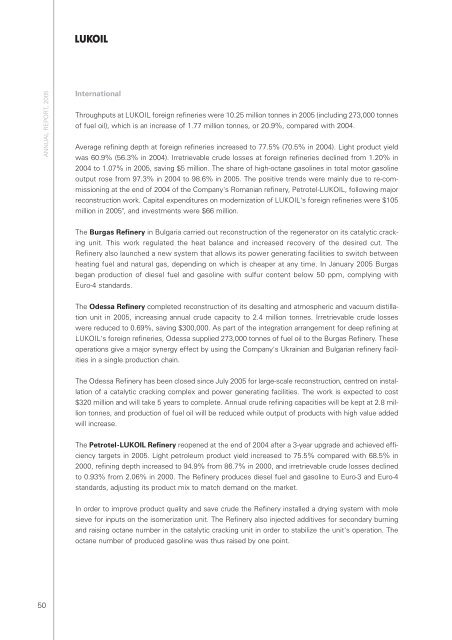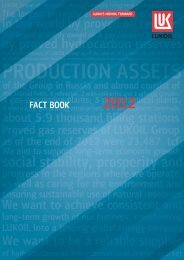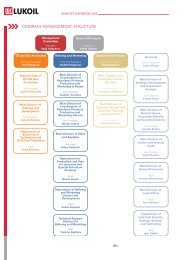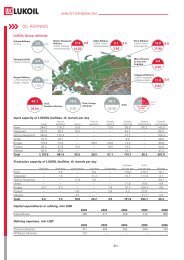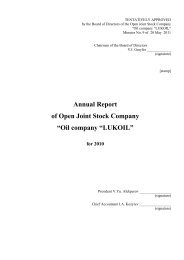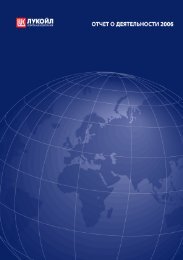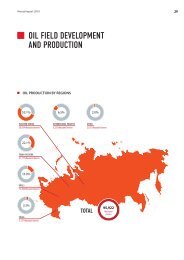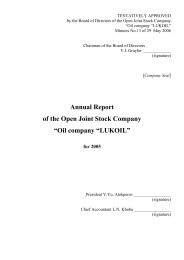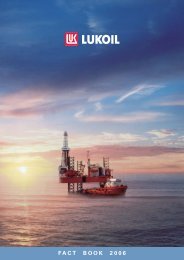ANNUAL REPORT 2005 - Lukoil
ANNUAL REPORT 2005 - Lukoil
ANNUAL REPORT 2005 - Lukoil
Create successful ePaper yourself
Turn your PDF publications into a flip-book with our unique Google optimized e-Paper software.
<strong>ANNUAL</strong> <strong>REPORT</strong>, <strong>2005</strong><br />
International<br />
Throughputs at LUKOIL foreign refineries were 10.25 million tonnes in <strong>2005</strong> (including 273,000 tonnes<br />
of fuel oil), which is an increase of 1.77 million tonnes, or 20.9%, compared with 2004.<br />
Average refining depth at foreign refineries increased to 77.5% (70.5% in 2004). Light product yield<br />
was 60.9% (56.3% in 2004). Irretrievable crude losses at foreign refineries declined from 1.20% in<br />
2004 to 1.07% in <strong>2005</strong>, saving $5 million. The share of high-octane gasolines in total motor gasoline<br />
output rose from 97.3% in 2004 to 98.6% in <strong>2005</strong>. The positive trends were mainly due to re-commissioning<br />
at the end of 2004 of the Company's Romanian refinery, Petrotel-LUKOIL, following major<br />
reconstruction work. Capital expenditures on modernization of LUKOIL's foreign refineries were $105<br />
million in <strong>2005</strong>", and investments were $66 million.<br />
The Burgas Refinery in Bulgaria carried out reconstruction of the regenerator on its catalytic cracking<br />
unit. This work regulated the heat balance and increased recovery of the desired cut. The<br />
Refinery also launched a new system that allows its power generating facilities to switch between<br />
heating fuel and natural gas, depending on which is cheaper at any time. In January <strong>2005</strong> Burgas<br />
began production of diesel fuel and gasoline with sulfur content below 50 ppm, complying with<br />
Euro-4 standards.<br />
The Odessa Refinery completed reconstruction of its desalting and atmospheric and vacuum distillation<br />
unit in <strong>2005</strong>, increasing annual crude capacity to 2.4 million tonnes. Irretrievable crude losses<br />
were reduced to 0.69%, saving $300,000. As part of the integration arrangement for deep refining at<br />
LUKOIL's foreign refineries, Odessa supplied 273,000 tonnes of fuel oil to the Burgas Refinery. These<br />
operations give a major synergy effect by using the Company's Ukrainian and Bulgarian refinery facilities<br />
in a single production chain.<br />
The Odessa Refinery has been closed since July <strong>2005</strong> for large-scale reconstruction, centred on installation<br />
of a catalytic cracking complex and power generating facilities. The work is expected to cost<br />
$320 million and will take 5 years to complete. Annual crude refining capacities will be kept at 2.8 million<br />
tonnes, and production of fuel oil will be reduced while output of products with high value added<br />
will increase.<br />
The Petrotel-LUKOIL Refinery reopened at the end of 2004 after a 3-year upgrade and achieved efficiency<br />
targets in <strong>2005</strong>. Light petroleum product yield increased to 75.5% compared with 68.5% in<br />
2000, refining depth increased to 94.9% from 86.7% in 2000, and irretrievable crude losses declined<br />
to 0.93% from 2.06% in 2000. The Refinery produces diesel fuel and gasoline to Euro-3 and Euro-4<br />
standards, adjusting its product mix to match demand on the market.<br />
In order to improve product quality and save crude the Refinery installed a drying system with mole<br />
sieve for inputs on the isomerization unit. The Refinery also injected additives for secondary burning<br />
and raising octane number in the catalytic cracking unit in order to stabilize the unit's operation. The<br />
octane number of produced gasoline was thus raised by one point.<br />
50


